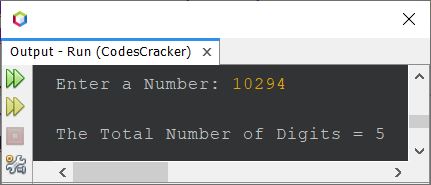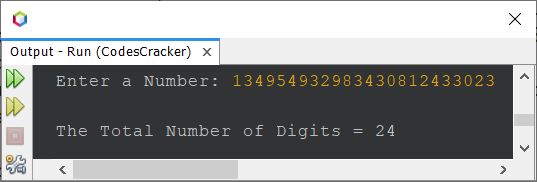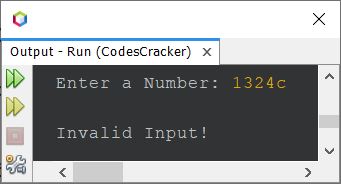- Java Basic Programs
- Java Programming Examples
- Java Print Hello World
- Java Get Input from User
- Java Print Integer
- Java Add two Numbers
- Java Check Even or Odd
- Java Check Prime or Not
- Java Check Alphabet or Not
- Java Check Vowel or Not
- Check Reverse equal Original
- Java Fahrenheit to Celsius
- Java Celsius to Fahrenheit
- Java Perfect Number Program
- Java Find Quotient Remainder
- Java Days to Seconds
- Java Count Digits in Number
- Java Binary Number Addition
- Java Discount Program
- Java Compute Courier Charge
- Java Find Telephone Bill
- Java Print ASCII Values
- Java Check Palindrome or Not
- Java Check Armstrong or Not
- Generate Armstrong Numbers
- Add two Numbers using Pointers
- Java Mathematical Programs
- Add Subtract Multiply & Divide
- Java Make Calculator
- Java Add Digits of Number
- Java Check Leap Year or Not
- Java Check Divisibility
- Java Find Simple Interest
- Java Find Compound Interest
- Java Print Fibonacci Series
- Java Find nCr nPr
- Calculate Average & Percentage
- Java Calculate Arithmetic Mean
- Java Calculate Student Grade
- Java Print Table of Number
- Java Print Prime Numbers
- Java Add n Numbers
- Java Interchange two Numbers
- Java Reverse Numbers
- Java Swap two Numbers
- Count Positive Negative & Zero
- Find Largest of two Numbers
- Find Largest of three Numbers
- Java Find Factorial of Number
- Java Find HCF & LCM
- Area & Perimeter of Square
- Area & Perimeter of Rectangle
- Area & Circumference of Circle
- Java Conversion Programs
- Java Decimal to Binary
- Java Decimal to Octal
- Java Decimal to Hexadecimal
- Java Binary to Decimal
- Java Binary to Octal
- Java Binary to Hexadecimal
- Java Octal to Decimal
- Java Octal to Binary
- Java Octal to Hexadecimal
- Java Hexadecimal to Decimal
- Java Hexadecimal to Binary
- Java Hexadecimal to Octal
- Java Pattern Programs
- Java Pattern of Stars
- Java Pattern of Alphabets
- Java Pattern of Numbers
- Java Pyramid of Stars
- Java Pyramid of Alphabets
- Java Pyramid of Numbers
- Java Print Diamond Pattern
- Java Print Floyd Triangle
- Java Print Pascal Triangle
- Java Array Programs
- One Dimensional Array Program
- Java Linear Search
- Java Binary Search
- Find Largest Element in Array
- Find Smallest Element in Array
- Java Reverse Array
- Insert Element in Array
- Delete Element from Array
- Java Merge two Array
- Java Bubble Sort
- Java Selection Sort
- Java Insertion Sort
- Java Find Common Elements
- Java Count Even/Odd Number
- Two Dimensional Array Program
- Java Add two Matrices
- Java Subtract two Matrices
- Java Transpose Matrix
- Multiply two Matrices
- Three Dimension Array Program
- Java String Programs
- Java Print String
- Find Length of String
- Java Compare two String
- Java Copy String
- Java Concatenate String
- Java Reverse String
- Delete Vowels from String
- Delete Words from Sentence
- Find Occurrence of a Character
- Java Find Occurrence of a Word
- Occurrence of Each Character
- Java Occurrence of Each Word
- Java Count Repeated Characters
- Java Count Repeated Words
- Java Capitalize Each Word
- Java Count Vowels/Consonants
- Java Extract Numbers
- Java Count Word in String
- Remove Spaces from String
- Java Sort a String
- Java Uppercase to Lowercase
- Java Lowercase to Uppercase
- Java Swap two Strings
- Java Check Anagram or Not
- Java Check Balance Parentheses
- Java Check Password Strength
- Java File Programs
- Java Read File
- Java Write to File
- Read & Display File Content
- Java Copy File
- Java Append Text to File
- Java Merge two File
- List files in Directory
- Java Delete File
- Java Miscellaneous Programs
- Generate Random Numbers
- Java Print Time & Date
- Java Get IP Address
- Java Shutdown Computer
- Java Programming Tutorial
- Java Tutorial
Java Program to Count Total Number of Digits in a Number
This article covers a Java program to find and print the total number of digits available in a number entered by user at run-time of the program. The program is created in multiple ways here.
Count Total Number of Digits in Java using while Loop
The question is, write a Java program to count the number of digits available in a given number using while loop. The program given below is the answer to this question:
import java.util.Scanner; public class CodesCracker { public static void main(String[] args) { int num, totalDigits=0; Scanner s = new Scanner(System.in); System.out.print("Enter a Number: "); num = s.nextInt(); while(num!=0) { totalDigits++; num = num/10; } System.out.println("\nThe Total Number of Digits = " +totalDigits); } }
Here is its sample run with user input 10294 as number to count all of its digits:

Count Total Number of Digits in Java using for Loop
The above program can also be created using for loop. Here is the program, counts total number of digits available in a number entered by user, using for loop, this time:
import java.util.Scanner; public class CodesCracker { public static void main(String[] args) { int num, totalDigits; Scanner s = new Scanner(System.in); System.out.print("Enter a Number: "); num = s.nextInt(); for(totalDigits=0; num!=0; num=num/10) totalDigits++; System.out.println("\nThe Total Number of Digits = " +totalDigits); } }
This program produces same output as of previous Java program.
Since the range of int data type in Java, is only 2,147,483,647, therefore you can change the data type from int to long whose range is 9,223,372,036,854,775,807. To do this, replace the following statement from above program:
int num, totalDigits;
with
long num, totalDigits;
And the following statement:
num = s.nextInt();
will get replaced with the statement given below:
num = s.nextLong();
That is, int to long and nextInt() to nextFloat().
But what if user enters a number who is even greater than the maximum value, a long type variable can hold. Therefore in that case, better to go with string type.
Count Digits in a Number using String
Here is the program, finds total number of digits of a number entered by user, using string. This program does not cares about the size of number, or how big the number is.
import java.util.Scanner; public class CodesCracker { public static void main(String[] args) { String num; int totalDigits; Scanner s = new Scanner(System.in); System.out.print("Enter a Number: "); num = s.next(); totalDigits = num.length(); System.out.println("\nThe Total Number of Digits = " +totalDigits); } }
Here is its sample run with user input 134954932983430812433023:

Now the question may arise, what if user enters string in place of integer ?
Then in that case, you can check whether each and every character of given string is a digit or not. Here is the program,
that provides the complete solution I think, of counting digits of an integer in Java:
import java.util.Scanner; public class CodesCracker { public static void main(String[] args) { String num; int totalDigits; char ch; Scanner s = new Scanner(System.in); System.out.print("Enter a Number: "); num = s.next(); totalDigits = num.length(); for(int i=0; i<totalDigits; i++) { ch = num.charAt(i); if(!Character.isDigit(ch)) { System.out.println("\nInvalid Input!"); return; } } System.out.println("\nThe Total Number of Digits = " +totalDigits); } }
Here is its sample run with user input 1324c:

« Previous Program Next Program »